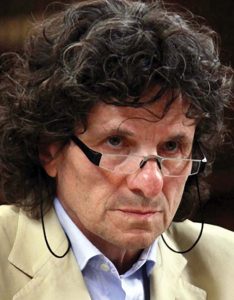The Religion of Liberty in Italy's Risorgimento
Guest speaker: Maurizio Viroli (Princeton University)
The Italian Risorgimento has been the theme at the core of the work of Maurizio Viroli. Currently a Professor at Princeton University, Viroli has earned a doctorate at the European University and works at the Italian University of Lugano as well. He has written several books on political thought in Italy. On Tuesday, March 29th the John Cabot community gathered in the Aula Magna to listen to Prof. Viroli’s speech on “the Religion of Liberty”.

Maurizio Viroli
After a brief introduction by Prof. Argentieri about the history of the Roman Republic, Prof. Viroli took the podium. His thesis was centered on Benedetto Croce’s “History of Europe“, a very influential book during the Fascist era. Viroli believes that behind every major movement and event in history lies a strong religious sentiment. All the poets, journalists, apostles, martyrs, artists, politicians that made history somehow were fueled by their complete devotion to an ideal. This ideal is referred to as “La Religione della Libertà”. “By religion”, Viroli explained, “I mean that feeling that makes you follow a certain moral or political principle with a devotion that if necessary translates in personal sacrifice”.
The religion of liberty is a moral force that leads from within the soul and is invincible. Those who have it cannot be defeated. The examples offered were the Anti-Fascist movement and the Resistenza during the XX century, as well as the Allied forces who challenged Nazism. Viroli centers his lecture on a question posed by Croce at the end of his book: “Will liberty have a future?” Croce believed that “Liberty has something better than the future. It has eternity”.
Was Croce right in asserting that Italian Risorgimento was fueled by a particular religious feeling?
According to Viroli, he was absolutely right, and history presents several facts supporting this thesis.
Alessandro Manzoni, for instance, in his poem “March 1821” talks about a God that listens to oppressed people. Manzoni’s God wants people to know He’s on their side. In the “Promessi Sposi”, Viroli continued, the real hero is Fra Cristoforo, a man of faith, a man who finds the strength to challenge Don Rodrigo in God. Another great example of the dedication of Italians towards a certain ideal during the Risorgimento is Giuseppe Verdi. Viroli believes that Verdi wrote the perfect music for his masterpiece “Va Pensiero” inspired by a religious feeling because the line “va pensiero sull’ali dorate” (go, thought on golden wings) could be interpreted as a paraphrase of the Bible.
Another question was raised during the conference: where do Italians get this religious sentiment from? What is the source?
Perhaps features of Italy’s old republican past are still alive today. Sismondi, a liberal Swiss protestant, said that Italians in the 15th century had a great republican spirit supported by the ideal that in order to be a good Christian, you first had to be a good citizen, practice charity and serve the common good. This seems to be supported by the view of Alexis de Tocqueville (author of Democracy in America), who wrote that republics need religion more than monarchies. There is no question that Christian religion is on the side of political liberty. So, Viroli continued, in order to achieve political liberty it is first necessary to strengthen the religious spirit of the people. In a society where people are not able or willing to practice devotion to a certain principle, there will never be liberty. It was Count Cavour, one of the founders of Italy as we know it today, who said that Liberty is the best ally of religion.
So what happened after the Risorgimento? Why and how did we lose this strong religious feeling? One of the explanations has already been given by the protagonists of the 19th century themselves. They complained that, despite its potential, the Risorgimento was not able to establish in Italy a moral and religious reformation.
Viroli concluded that we Italians have been extremely unwise to forget the religious dimension of the Risorgimento. Had we not forgotten it, probably the quality of our moral, civic and political life would be not so repulsive right now.





